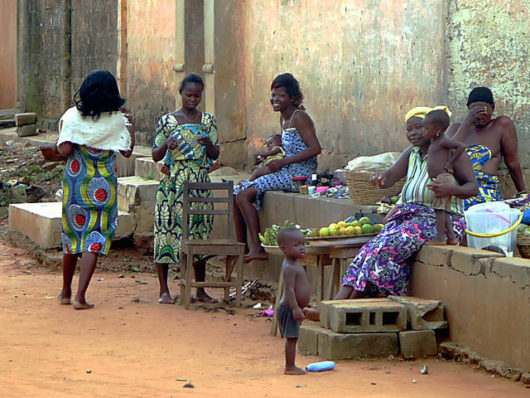Top 10 Facts About Living Conditions in Benin

Benin is a relatively small country located in West Africa and is home to approximately 11.7 million people. The climate is hot and many people are impoverished. As of late, organizations have started programs in Benin to reduce poverty and alleviate the problems associated with it. Living conditions in Benin can vary for those living in urban areas versus those living in rural areas, with those in urban areas typically having access to more resources.
Although Benin is working toward development, with increases in business and transportation, the country still faces issues associated with underdevelopment. With increased development, a decrease in poverty is likely to follow. In this article, the top 10 facts about living conditions in Benin are discussed.
Top 10 Facts About Living Conditions in Benin
- More than one-third of the population in Benin is impoverished. While equality for women is largely lacking, families in which women are the leaders have lower levels of poverty. According to The World Bank, the levels of poverty are 28 percent for women-led families compared to 38 percent for male-headed families.
- Natural resources are not the easiest to find in Benin. However, agriculture plays a large part in the country’s economy. Increased cotton production led to a positive increase in GDP from 4.0 percent in 2016 to 5.6 percent in 2017. Additionally, domestic oil has benefited economic productivity.
- From a political standpoint, Benin is doing well. Their democratic elections are peaceable and people are generally pleased with those in power. In the 2016 presidential election, cotton businessman, Patrice Talon, won. His election provides for positive increases with trade between Benin and its foreign partners.
- The Global Hunger Index rates Benin at a 24.3, which means that Benin is labeled under the “serious” category for hunger. While that number reflects a large number of people facing malnutrition, the number of people facing food insecurity is decreasing over time. This is hope-inspiring evidence that organizations working to combat hunger such as UNICEF are gradually making progress in Benin.
- Sanitation remains an issue in Benin. According to UNICEF, only 20 percent of people have access to basic sanitation services. Open defecation is practiced by half of the population and lack of toilets can cause other health issues. This can be instrumental in the spread of various diseases. Organizations, such as UNICEF, are working to improve sanitation in countries where open defecation is still practiced through expanding access to sanitation services.
- Transportation in Benin is developing. Currently, urban roads are primarily paved, unlike rural areas. There is a railroad in Benin connecting domestic cities, but it does not go into any other nations. Cotonou, a largest and economically most important city, has a port and airport, proof of development.
- Child marriage is a serious problem for the country. Girls Not Brides reports that 26 percent of girls in Benin are married before their 18th birthday. This issue persists, in part, from gender inequality. The United Nations, UNICEF and the Government of Benin are working to fight this through advocating for policy changes regarding the legal age of marriage.
- Nigeria and Benin have a close relationship. The majority of Benin’s exports go to Nigeria. Consequently, the economy in Nigeria can have both positive and negative effects on the country. Lately, increases in Nigeria’s economy have led to subsequent improvements in the economy of Benin. Trade is somewhat limited, partially resulting from lack of credit access to the people. However, in recent years, aspects of business, such as agriculture and exports, have positively grown.
- Seven percent of the country’s expenditures go toward public health. Under-five mortality rates are at a continuous decline. With growing emphasis placed on health care, this trend should continue. In addition, private health care is growing. There are some limitations though. For example, private health care is typically only available in urban areas. Within the health sector, UNICEF is diligently working to improve health care for both women and children through shaping policy and providing access to health care services.
- Benin initiated free public education for all citizens in 2007. International schools are also options for those who can afford it. Higher education is also a possibility in Benin at the National University of Benin.
Based on these top 10 facts about living conditions in Benin, it is clear that poverty is still abundant in the country. However, in recent years, there have been many efforts to combat underdevelopment and improve living conditions. Organizations, such as UNICEF and USAID, are working to improve the quality of living conditions in the country. UNICEF places an emphasis on helping women and children. USAID has implemented programs to shed light on corruption in Benin. These top 10 facts about living conditions in Benin show that with the joint efforts of these organizations and local communities, the country has a bright future.
– Carolyn Newsome
Photo: Flickr
